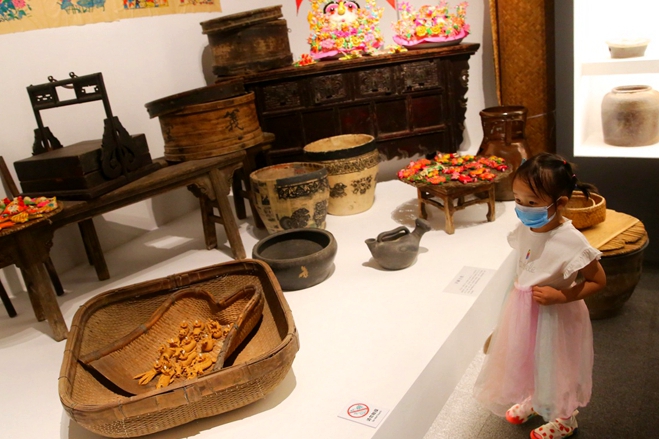Shandong promotes Confucianism culture around the world
Shandong province, the hometown of Confucius, is taking measures to promote Confucianism - to better introduce traditional Chinese culture to the world stage.
The Eighth World Confucian Conference, to be held on Sept 20 in Confucius' birthplace, Qufu, is a key platform for the province to strengthen Confucianism studies and communication. The conference has long served as a platform for global experts to discuss Confucianism's historical value and its significance in modern society.
Themed "Confucianism and a community of shared future for mankind", the conference is sponsored by the Ministry of Culture, the Shandong government, and is organized by the Shandong Provincial Department of Culture, the Chinese National Academy of Arts and Shandong University.
|
Children read Confucian classics under the guidance of a teacher at an event to promote traditional culture in Qufu, Shandong province. Photos Provided to China Daily |
|
A teacher at Nishan Academy teaches students traditional rites at class in Dongying, Shandong province. |
The 2017 conference - which calls for people to pay more attention to the world's development - will have five main topics: the religion and beliefs under Confucianism; Confucian ethics and common human values; Confucianism and individual values; rites civilization and value reconstruction in modern society; and the modern path of inheriting and developing traditional culture.
More than 200 experts from more than 30 countries and regions will discuss a series of hot topics and exchange the latest opinions on Confucianism research and studies.
Li Guolin, deputy director of the Shandong Provincial Department of Culture, said that the Confucius Cultural Award - first launched in 2009 to reward special contributions to the field - will be replaced by another award this year, named World Distinguished Researcher in Confucianism.
The event organizers will release the top 10 hot topics in Confucianism over the past two years, to strengthen research-related communications and to promote cultural development.
Li said Confucius' philosophy is the mainstream of traditional Chinese culture. It is the invaluable legacy of China and has strongly impacted Asian and even the world's cultural development. It is an important part of the history of civilization.
She said Confucianism studies had in recent years become more popular among the younger generation. This year, experts will be invited to participate in related forums, covering topics such as the advantages and disadvantages of children learning Confucianism, Confucianism and rural construction, and Confucianism and traditional Chinese culture.
The Eighth World Confucian Conference - Young Doctors Forum will take place during the event.
The conference organizers said Confucius and his teachings can provide inspiration for people to recognize the changes taking place around the world. They can also inspire state leaders in terms of national management. Chinese and overseas experts are welcome to communicate on a variety of topics to spread Chinese culture and Confucian thinking, according to the organizers.
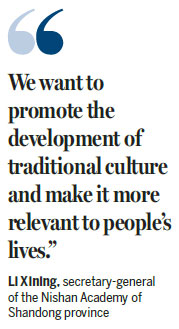
Academic cooperation
It is the first time for Shandong University to be the main event organizer. Hu Jinyan, vice-president of Shandong University, said the school has unique advantages in Confucianism research. Located in the hometown of Confucius, the university has paid significant attention to the traditional Chinese culture studies represented by Confucianism, and has accumulated a wealth of academic research, establishing a strong foundation for Shandong University to host the Eighth World Confucian Conference.
The Shandong government partnered with Shandong University in 2010 to establish the Advanced Institute of Confucian Studies. The institute aims to explore the value of traditional Chinese culture and ensure it can serve the demands of modern society. It is also set to expand its team, to strengthen cultural integration on an international level and to promote research.
Wang Xuedian, executive vice-president of the Advanced Institute of Confucian Studies, said that the institute has integrated global resources to promote Confucianism development in three aspects: academic projects, academic events and academic results publishing.
"We hope to build the institute into a world Confucianism study center and develop Confucianism into a global subject," Wang said.
Initiated by the Shandong University, the Collaborative Innovation Center of Confucian Civilization was established in Shandong in 2015 with support of academic institutions such as Yale University, the University of Chicago, the University of Hawaii and Tsinghua University.
The center is designed as a think tank that can support the national cultural development strategy and social management. It will collect, sort and study documents that reflect Confucian civilization. It will also be a talent-training center in China.
Expanding awareness
Over the past few years, Shandong has hosted the Nishan Forum on World Civilization in cities such as Qufu, Beijing, New York and Paris, to further promote dialogue among different civilizations and uphold Chinese culture.
Starting in 2014, the Shandong Provincial Department of Culture encouraged public libraries to partner with the Nishan Academy, an institute founded during the Song Dynasty (960-1279) to promote Confucianism. Some learning programs and classes are also available in rural areas and communities.
"We are not only rebuilding an ancient academy. We want to combine the academy with libraries to introduce Confucian culture and its related documents to ordinary people," said Li Xining, secretary-general of the Nishan Academy of Shandong province. "We want to promote the development of traditional culture and make it more relevant to people's lives."
So far, all public libraries in Shandong have a Nishan Academy branch. The academy has hosted over 4,000 cultural events.
Shandong province has established more than 10,300 classes in rural areas to promote Confucianism. More than 5 million people have participated in over 40,000 events.
The province has committed to promoting its traditional culture to overseas audiences. There are nearly 30 Nishan libraries in countries such as Australia, Russia and New Zealand.
(China Daily 09/19/2017 page24)

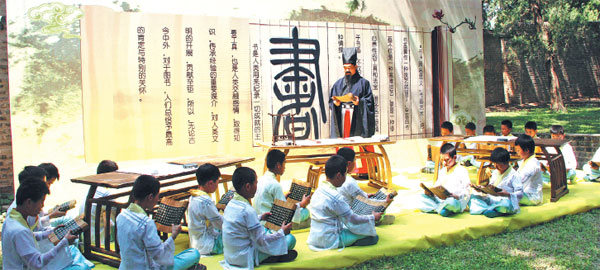
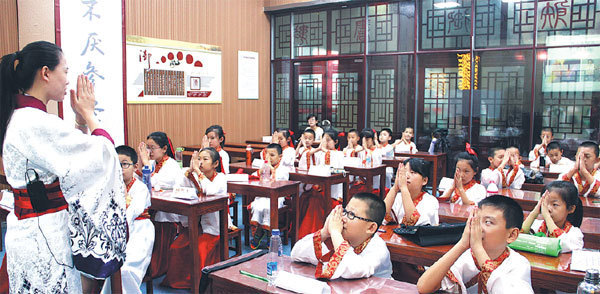
 Shandong Culture and Tourism Consumption Season
Shandong Culture and Tourism Consumption Season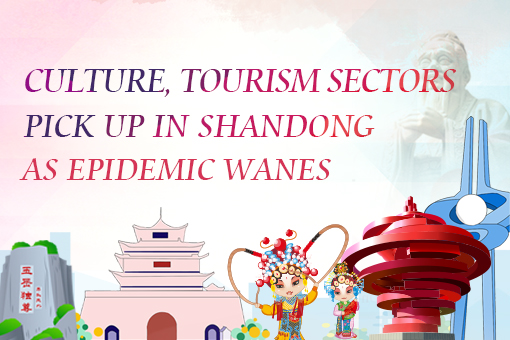 Culture, tourism sectors pick up in Shandong as epidemic wanes
Culture, tourism sectors pick up in Shandong as epidemic wanes
